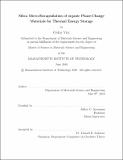Silica micro-encapsulation of organic phase-change materials for thermal energy storage
Author(s)
Viry, Cédric.
Download1118689834-MIT.pdf (28.12Mb)
Other Contributors
Massachusetts Institute of Technology. Department of Materials Science and Engineering.
Advisor
Jeffrey C. Grossman.
Terms of use
Metadata
Show full item recordAbstract
Renewable energy production and storage are our main levers to fight climate change. As the battery industry struggles to manufacture cheap, cyclable and safe systems, thermal energy storage recently became a more active area of research, promising cheap and cyclable storage materials. In the U.S., nearly 70% of the energy input ends up as thermal losses. More than a third of these losses are generated at electricity production plants and another third in the transportation sector. Combined, these two sectors waste nearly 50% of the total U.S. energy feed. Thermal energy storage can help take advantage of this opportunity by allowing to revalorize waste heat. High-temperature thermal energy storage can be used to generate electricity but requires large and expensive systems that can only be charged with high-grade energy sources (usually electricity or solar energy). This study focuses on organic Phase-Change Materials for use with low-grade heat sources for domestic heating applications. Engineering organic phase-change material energy storage systems is complicated because of their very low thermal conductivity, the leakage of the liquid phase and the thermal expansion that comes with phase-change. Micro-encapsulation is an elegant solution to all of these problems. Polymer micro-encapsulation of these phase-change materials has been achieved with success but other classes of shell materials such as metals and ceramics can offer more desirable thermal properties. In this study, we use the sol-gel process of tetraethyl orthosilicate to synthesize silica microcapsules containing a variety of organic phase-change materials. We characterize these capsules to compare their thermal and protective properties to the bulk phase-change material in order to assess their viability as a heat storage medium. Our results show that it is possible to synthesize microcapsules containing several types of phase-change materials with this process. The synthesis leads to porous microcapsules which would require additional processing to achieve all of the micro-encapsulation goals. However, we also show that the main thermal properties are conserved and that for some materials such as sugar alcohols, some thermal properties can even be enhanced.
Description
This electronic version was submitted by the student author. The certified thesis is available in the Institute Archives and Special Collections. Thesis: S.M., Massachusetts Institute of Technology, Department of Materials Science and Engineering, 2019 Cataloged from student-submitted PDF version of thesis. Includes bibliographical references (pages 99-107).
Date issued
2019Department
Massachusetts Institute of Technology. Department of Materials Science and EngineeringPublisher
Massachusetts Institute of Technology
Keywords
Materials Science and Engineering.